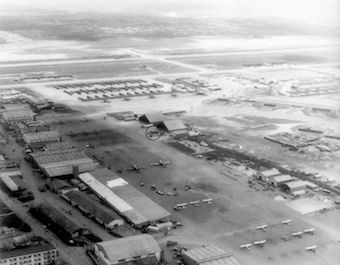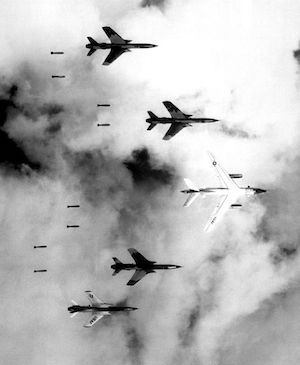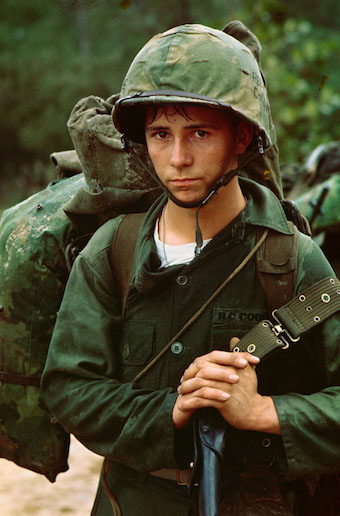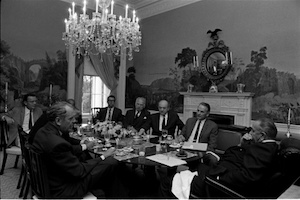Escalation
US military presence in Vietnam intensified in 1965 as President Johnson sought to prevent Saigon's collapse
On TV screens across the United States, a wide-eyed girl plucks petals from a daisy as she softly counts to 10. Just as she reaches nine, a man's voice begins methodically counting back down to zero, as the image switches to a swelling, ominous nuclear cloud.
Widely viewed as one of the most provocative ads in American political history, this spot, which aired on September 7, 1964, painted the incumbent president Lyndon Johnson as a man of peace and cast his Republican opponent in the presidential election, Barry Goldwater (R-Arizona), as a dangerous warmonger.
The ad, which received far more air time on TV newscasts than it did as a standalone commercial, likely served its purpose, as the American electorate voted LBJ back into office in a landslide. Little did the public know—nor, perhaps, did Johnson—that the United States would soon radically escalate US involvement in Vietnam, transforming what had been a military assistance and advisory mission into a full-scale American war.
THE STALEMATE STRATEGY

Just days before the 1964 election, the US air base at Bien Hoa was attacked by Communist guerrillas, killing four Americans, wounding scores of others, and destroying more than 25 aircraft. Johnson opted not to respond militarily and risk Americans carrying that image of him into the polling booth.
But on November 3—Election Day—he asked for a review of Vietnam policy from a newly created interagency task force, chaired by William P. Bundy, chief of the State Department’s Bureau of Far Eastern Affairs, and brother of National Security Advisor McGeorge Bundy.
The working group settled on three potential policy strands from which to choose: maintaining the current approach, escalating the war and striking at North Vietnam, or pursuing a strategy of graduated response—the last of which anticipated a military stalemate that policy makers hoped would force Hanoi to the negotiating table.
Following weeks of intensive discussion, Johnson endorsed the third option—Option C in the administration’s parlance. The plan for a “slow squeeze” of Hanoi envisioned military measures of gradually increasing intensity. Johnson hoped this low-key approach would preserve support for the Great Society at home while crippling Hanoi’s ability to support the insurgency in South Vietnam.

The first phase of Option C began on December 14, 1964, with the bombing of North Vietnamese supply lines in Laos. The operation drew heavy criticism on Capitol Hill. When interviewed by ABC News in January 1965, the new House Minority Leader, Rep. Gerald Ford (R-Michigan), denounced the way in which the administration informed Congress of the Laotian operation. “Now that it has been disclosed piecemeal,” Ford said, “I think that the administration has a responsibility to open up, have some discussion about it, perhaps hold some hearings in the House or Senate in order that we are all better informed as to what our course, what our policies are.”
Johnson responded to Ford's criticism in the recorded phone call below, telling the Minority Leader, "We've done nothing but brief—actually that's one of our problems."
No amount of information spin could mask the worsening problems of political instability in South Vietnam and Communist success in the field. Alarmed by Saigon’s deteriorating position, Johnson would soon consider even more dramatic action, sending his national security advisor to South Vietnam in early February 1965 to gauge the need for an expanded program of bombing.
Bundy’s trip coincided with Communist raids in the Central Highlands that killed more than 30 American soldiers, injured hundreds more, and damaged or destroyed dozens of aircraft. Within days of the attacks, LBJ signed off on a program of sustained bombing of North Vietnam that, except for a handful of pauses, would last for the remainder of his presidency.
While military and civilian officials differed on the benefits of the air campaign—code-named Operation Rolling Thunder—all of them hoped that the bombing, which began on March 2, 1965, would lead Hanoi to end its support of the insurgency in South Vietnam.
A man can fight if…he can see daylight down the road somewhere.… But there ain’t no daylight in Vietnam.
The Communist attacks on US installations also highlighted the vulnerability of the air bases to be used for the bombing campaign. In an effort to shore up base security, Johnson dispatched two Marine battalions to South Vietnam in early March.
The move worried Johnson. Like other major decisions he made during the escalatory process, this one filled him with dread. As the president expressed to Senator Richard Russell (D-Georgia), a longtime confidant, he understood the symbolism of “sending the Marines” and their likely impact on the combat role the United States was coming to play, both in reality and in the minds of the American public. But their arrival, he feared, was unlikely to improve America’s position.
Just days before the landing at Danang on March 8, Johnson revealed his doubts about the war in Vietnam to Senator Russell (audio below). “The great trouble I’m under,” Johnson said, “a man can fight if…he can see daylight down the road somewhere.… But there ain’t no daylight in Vietnam.”

"WE WILL NOT BE DEFEATED"
The bombing failed to move Hanoi or the Viet Cong in any significant way. By mid-March, Johnson began to consider additional proposals for expanding America’s combat presence in South Vietnam. By April 1, he had agreed to send in two more Marine battalions. He also changed their role from static base security to active defense and soon authorized the preparatory work needed for stationing many more troops in Vietnam.
As the bombers flew and the commitment expanded, criticism of Johnson’s policies mounted. The president sought to convince the American public, international opinion, and even the North Vietnamese that the United States had more to offer than just guns and bombs.
On April 7, before an audience at the Johns Hopkins University in Baltimore, LBJ outlined a program of economic aid for both South and North Vietnam, characterized by efforts to fund a $1 billion project to harness the productive power of the Mekong River. He coupled that vision with rhetoric designed to highlight the administration’s willingness “to discuss,” if not negotiate, aspects of the conflict.
“We do this [escalating US military involvement in Vietnam] in order to slow down aggression," Johnson said in the speech (video below). "We do this to increase the confidence of the brave people of South Vietnam who have bravely born this brutal battle for so many years with so many casualties. And we do this to convince the leaders of North Vietnam—and all who seek to share their conquest—of a simple fact: We will not be defeated. We will not grow tired. We will not withdraw either openly or under the cloak of a meaningless agreement.”
Communists from both north and south rejected Johnson’s terms, one of numerous instances over the following three years in which the parties failed to find even a modicum of common ground.
THE DOMINICAN CRISIS
A few weeks later, on April 28, a crisis broke out in the Dominican Republic that offered striking parallels to the situation in Vietnam. A coup had taken place in the Caribbean nation that threatened to bring a left-leaning regime to power. Reporting that more than 1,000 Americans were seeking refuge in one of the city’s largest luxury hotels and that the situation on the streets was quickly deteriorating, Ambassador W. Tapley Bennett Jr. cabled Washington, indicating that he and his colleagues were “unanimously of opinion that time has come to land the marines. . . . American lives are in danger.”
On May 2, Johnson addressed the American people to explain the mission (video below), stating, “I want you to know that it is not a light or an easy matter to send our American boys to another country, but I do not think that the American people expect their president to hesitate or to vacillate in the face of danger just because the decision is hard when life is in peril.” Within three weeks, there were 30,000 troops in the Dominican Republic.
Fearful of “another Cuba,” Johnson was personally and heavily involved in managing the situation, but soon confessed his doubts and uncertainties about the wisdom of sending troops.
Over the ensuing weeks and months, reporters and legislators would also question the need for military intervention in the Dominican Republic. Critics accused the Johnson administration of overreacting and lending too much credence to claims of Communist influence among the factions vying for power. Particularly critical was J. William Fulbright (D-Arkansas), chairman of the Senate Foreign Relations Committee, who took the Johnson administration to task for its lack of candor—both in the Dominican crisis and then later regarding the war in Vietnam.
MAYFLOWER

In an effort to provide greater incentive for Hanoi to come to the bargaining table, Johnson sanctioned a limited bombing halt, code-named Mayflower, for roughly one week in the middle of May. No interest on the part of the North Vietnamese was forthcoming.
Following the failure of Mayflower, Johnson resumed the bombing and increased its intensity as South Vietnam continued to suffer increasing strain from both political instability and pressure from Communists.
Civilian rule in Saigon came to an end in mid-June as military officials rose to prominence at the head of a new ruling war cabinet. The spate of endless coups and governmental shake-ups vexed Johnson, who wondered aloud to his advisors whether the South Vietnamese could ever stop the Communists in the countryside when they were feuding with each other in Saigon.
But the time had come for harder decisions. In early June, General William C. Westmoreland, commander of MACV, requested the deployment of an additional 44 battalions to stave off a South Vietnamese collapse. For the next several weeks, Johnson and his advisors would consider Westmoreland’s troop request—which, if granted, would represent the most significant of all the escalatory moves LBJ had made that spring. At stake was the nature of the war itself: whether a conflict that had largely been a Vietnamese affair would now become an increasingly American one.
*Adapted from "Lyndon B. Johnson and the Vietnam War," by David Coleman and Marc Selverstone on millercenter.org.